Stanley Hunt, Chan Pui-Tak (陳沛德) was born in 1927 in Shekki, the town centre of Zhongshan County in Guangdong Province. In 1939, Stanley, his mother and two younger siblings left Shekki to join his father in Australia because of the Japanese invasion. They joined Stanley’s father, Harry Hin Hunt(陈欣), at Warialda, a small town in northern NSW, where he operated a general store. The business had been doing well until 1938 when a man from the same village (Mashan) in Zhongshan opened a store opposite to his and took away many of their customers, bringing Harry Hin Hunt nearly to the point of bankruptcy. When Stanley and his mother arrived, his father stopped giving credit to his customers and negotiated a deal to repay his debt.
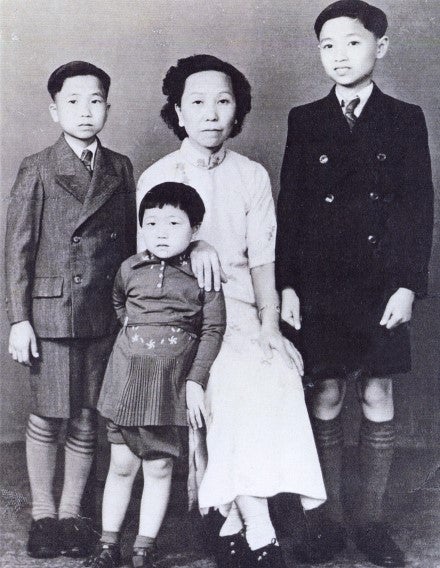
Stanley Hunt with his mother and siblings on the eve of leaving for Sydney (1939)
Stanley adapted well to life in Warialda, a small town with only 1,025 people. A few of the local kids 'Would call you Ching Chong Chinaman and all that. That’s nothing, we are Ching (of the Qing Dynasty 1644-1912) in the old days'. Despite barely knowing the alphabet when he first arrived, he went to the Catholic school there and learnt English very quickly with the help of one of the nuns, Sister Bernadette, who tutored him after school hours. 'We continued our friendship until she died, in about 1990, in Adelaide.' Apart from running a general store, Stanley’s family also bought a market garden in Warialda from an old Chinese man who has been sick. Stanley was 16 years old at that time. 'I drove a horse and cart to sell vegetables from town to town…' he enjoyed driving a horse and cart to sell vegetables from town to town, house to house. 'My mother was horrified at me taking the horse out, but she finally gave in and let me do it. I had a lot of fun on the horse.'
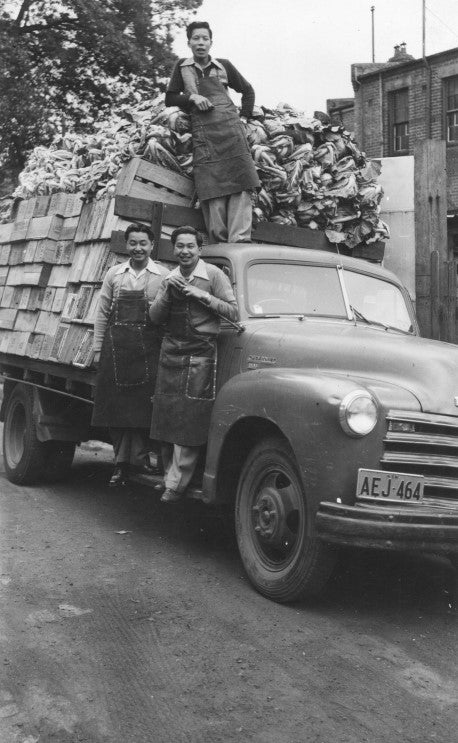
Stanley, his brother Desmond and cousin Alan Wong with a truckload of produce for their fruit shops in Merrylands and Auburn
By 1945, the family has grown into nine members (Stanley has six siblings). When Stanley was 18 the family decided to move to Sydney as they reckoned there was limited opportunity for expanding their business in a country town. When they arrived in Sydney they bought land at Wetherill Park to grow beans, vegetable marrow and cucumbers. But they didn’t earn much money as the price of beans and vegetables was very low due to oversupply in the market. Later, Stanley’s father bought a fruit shop in Merrylands for 1050 pounds and the family of nine moved into the three-bedroom apartment upstairs of the shop. The business of the fruit shop did very well and they bought another fruit shop in Auburn in the following year. Stanley was sent to work at the Auburn shop to build up the business and he made such a success of it that he was soon employing 28 people to help run it.
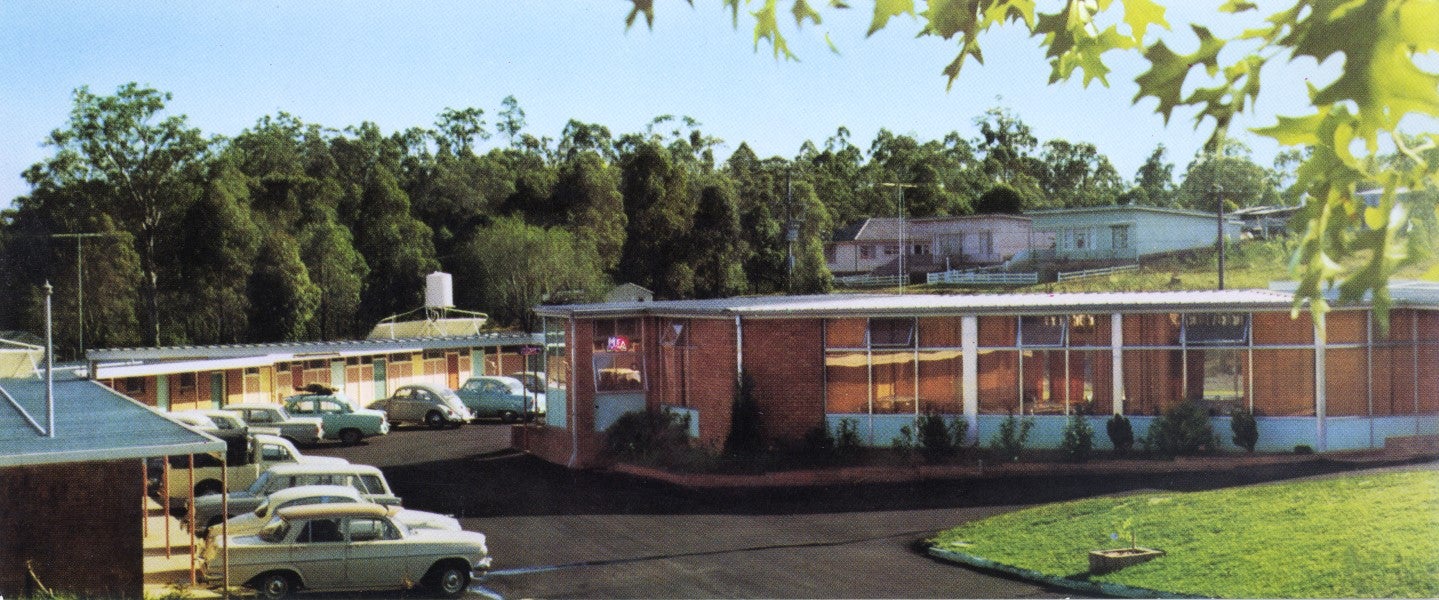
Stanley Hunt's motel in Liverpool (1964)
In 1960, Stanley and his father decided to venture into the motel industry. They bought a tea-room with five acres of land attached to it at the Crossroads on the Hume Highway in Liverpool and built an 11-unit motel there, called ‘Hunt’s Motel’. Stanley sold the fruit shop after he started the motel business with his father. Later, he also started other motels elsewhere. Now, the motel in Liverpool has grown into a 4-star motel with about 140 rooms. It is owned and managed by Harry Hunt, Stanley’s youngest brother, under the trading name of Country Comfort Hunts Liverpool.
Australia-China Connections
Stanley’s early membership of the Freemasons and Rotary gave him the experience as an organiser that helped him when in 1981 he was elected as the Chairman of Australian Chinese Community Organisation (ACCA) and president of the Chungshan Society (1988-1992). He played a key role in raising funds to buy a terrace house in Albion Street, Surry Hills for the Society’s clubhouse. He also helped raise money to build the Chow Cho Poon Nursing Home in Earlwood and the Bernard Chan Nursing Home in Burwood for elderly Chinese people. To acknowledge his longstanding contributions, the Australian Nursing Home Foundation named a wellness centre in Ultimo the ‘Stanley Hunt Centre’.
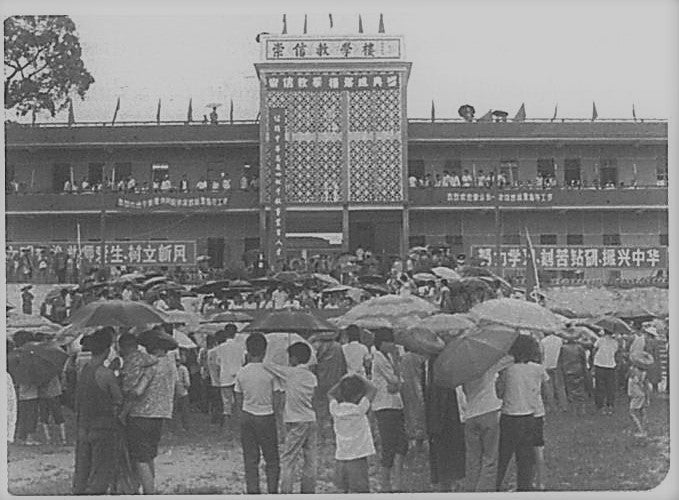
The official opening of the Mashan Primary School (1983)
Stanley’s charity work extended to mainland China. In the early 1980s he funded the construction of a sixteen-classroom school building and a library in his father’s home village of Mashan, Doumen District in Zhuhai (previously a part of Zhongshan). Stanley and his father visited China in 1979 and realised the children at the village had no school to go to. Stanley decided to build a school—Mashan Primary School—which could house 800 students. It was completed in 1983 and he named a teaching building and a library building in honour of his father and mother, respectively. Later he contributed funds to build the teachers’ residence, playground, football fields, and the monumental school gate. He handed the school over to the government after supporting it for 30 years. In 2016, the government discussed with him their plan to demolish the teaching building and rebuild it with earthquake-proof materials. The new school will continue to use the old name and the library would remain. In addition to the school, Stanley also donated money to refurbish his clan’s ancestral hall in Mashan, now being used as a community centre for the elderly.
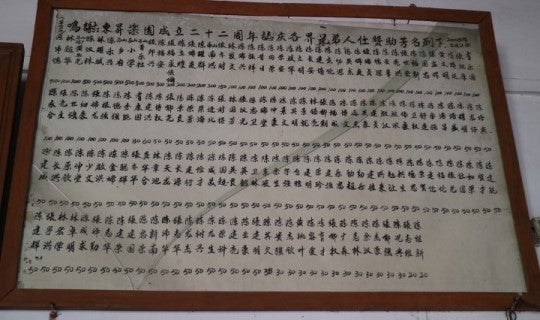
Stanley still donates to various activities in Mashan village (Stanley's name is on top row, first from left)
Stanley has received the Order of Australia Medal (OAM), the New South Wales Premier’s Community Award, and in China he has been made Honorary Citizen of Doumen District and the City of Zhuhai.
Return Journey
By 2017, Stanley has been back to China about 40 times, beginning around 1978. On his first trip, Stanley, his wife and his father flew to Beijing and then took the train to Nanjing and Guangzhou, but they did not go to his father’s home village, Mashan. They went there on their second trip and Stanley met his father’s niece who had a difficult life. Stanley built her a house and began supporting her financially until she passed away.
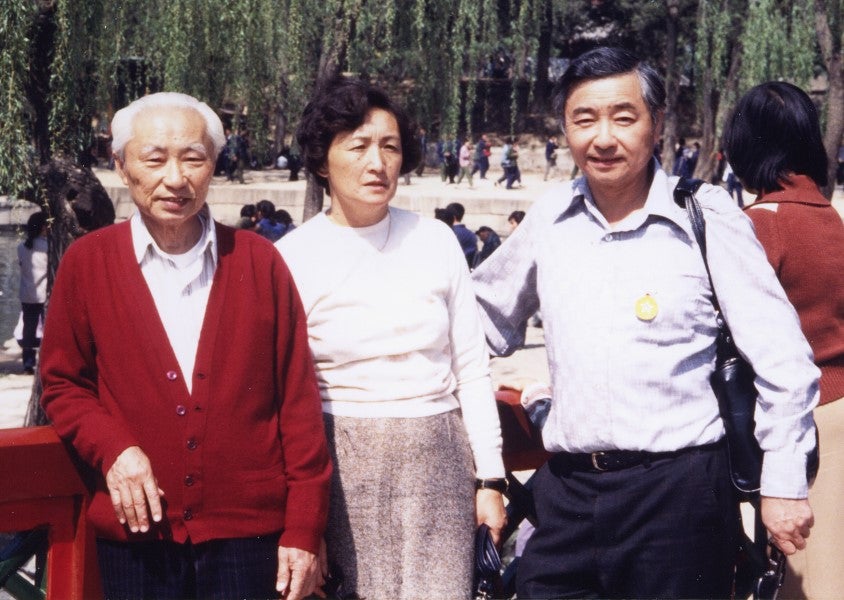
Stanley, Valmai and his father travelled to China (1983)
Stanley had an ancestral house in Mashan, but his father had given it away. The occupant has moved out from the house in the 1980s, since then it was abandoned. The house consisted of one small square block of land occupied by a single-storey brick house which is now in ruins.
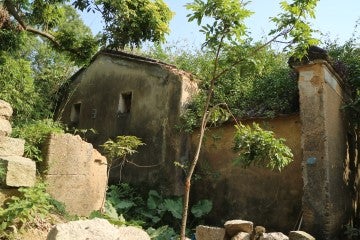
Stanley Hunt's ancestral home in Mashan was abandoned (2017)
Even in his nineties, Stanley went to China every year. Sometimes, he travelled with a family member or a group of friends. In 2018 he went with his grandson, around the time of the Ching Ming Festival, to pay homage to their ancestors’ graves. He moved his ancestors’ remains three times due to development projects until finding them a permanent home in a lawn cemetery.
He also returned, in the late 2000s, to Warialda with his sister, Dr Mabel Lee, and his younger brother and his wife. They found that their old shop had burned down, but a welcome morning tea was put on for them which 50 to 60 people attended. Stanley met some of his old school friends. 'We got a big write up in the paper,' he said.
The above account of Stanley's life and of his family history was based on an interview with Stanley conducted at his house in Cabarita, Sydney, in 2017, and the book 'From Shekki to Sydney: An autobiography by Stanley Hunt' (published by Wild Peony, 2009). Stanley passed away in July 2019 at the age of 93. He was remembered as a 'kind, generous man who lived a full life and inspired all who knew him' (The Australian Nursing Foundation, 2019).
